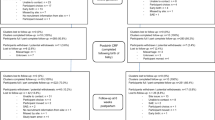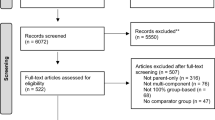Abstract
Background/Objectives:
Pregnancy is a life stage where excess weight gain may occur and the postpartum period is often characterised by weight retention. The aim of the current study was to evaluate the feasibility of undertaking a randomised controlled trial of a weight loss intervention (WeighWell) in postpartum women living in areas of social disadvantage.
Subjects/Methods:
The study aimed to recruit 60 women who were not pregnant, 6–18 months postpartum with a body mass index >25 kg/m2 living in areas of deprivation within Tayside, UK. Recruitment strategies focused on visits to community groups; writing directly to postpartum women living in areas of deprivation and primary care teams who covered the most deprived 15% of the population and advertising in community settings. The 12-week intervention used motivational interviewing techniques to promote an energy deficit diet and increased physical activity, delivered by three face-to-face consultations plus three structured telephone calls.
Results:
Of 142 women screened, 63 were eligible and 52 (83%) were recruited and randomised to an intervention (n=29) or comparison group (n=23). Over the 12-week intervention, body weight changed significantly by −1.6±2.0 kg in the intervention group compared with +0.2±2.2 kg in the comparison group, indicating the potential efficacy of the intervention. Loss to follow-up was 24% in the intervention group and 39% for the comparison group.
Conclusions:
The findings support the development of a definitive trial that embraces personalised recruitment strategies and the development of approaches to improve retention over a clinically relevant intervention period.
This is a preview of subscription content, access via your institution
Access options
Subscribe to this journal
Receive 12 print issues and online access
$259.00 per year
only $21.58 per issue
Buy this article
- Purchase on Springer Link
- Instant access to full article PDF
Prices may be subject to local taxes which are calculated during checkout

Similar content being viewed by others
References
British Heart Foundation (2006). So you want to lose weight for good. http://www.bhf.org.uk/publications/view_publication.aspx?ps=1000807 (accessed 21 September 2010).
Brown M, Byatt T, Marsh T, Mcpherson K (2010). A prediction of obesity trends for adults and their associated diseases. http://nhfshare.heartforum.org.uk/RMAssets/NHFreports/NHF_adultobese_short_170210.pdf (accessed 21 September 2010).
Calfas KJ, Marcus BH (2007). Postpartum weight retention: a mothers weight to bear. Am J Prev Med 32, 356–357.
Carter-Edwards L, Ostbye T, Bastian LA, Yarnall KSH, Krause KM, Simmons TJ (2009). Barriers to adopting a healthy lifestyle: insight from postpartum women. BMC Res Notes 2, 161.
Craig P, Dieppe P, Macintyre S, Michie S, Nazareth I, Petticrew M (2008). Developing and evaluating complex interventions: the new Medical Research Council guidance. http://www.bmj.com/content/337/bmj.a1655.full (accessed 21 September 2010).
Deurenberg P (2009). Body composition. In: MJ Gibney, HH Vorster and FJ Kok (eds). Introduction to Human Nutrition. Chichester: Blackwell Publishing. pp 23–26.
Galtier-Dereure F, Boegner C, Bringer J (2000). Obesity and pregnancy: complications and cost. Am J Clin Nutr 71, S1242–S1248.
George GC, Hanss-Nuss H, Milani TJ, Freeland-Graves JH (2005). Food choices of low-income women during pregnancy and postpartum. J Am Diet Assoc 105, 899–907.
Gore SA, Brown DM, West DS (2003). The role of postpartum weight retention in obesity among women: a review of the evidence. Ann Behav Med 26, 149–159.
Gray DS, Bray GA, Bauer M, Kaplan K, Gemayel N, Wood R et al. (1990). Skinfold thickness measurements in obese subjects. Am J Clin Nutr 51, 571–577.
Heslehurst N, Rankin J, Wilkinson JR, Summerbell CD (2010). A nationally representative study of maternal obesity in England, UK: trends in incidence and demographic inequalities in 619 323 births, 1989–2007. Int J Obes 34, 420–428.
Kuhlmann AK, Dietz PM, Galavotti C, England LJ (2008). Weight management interventions for pregnant or postpartum women. Am J Prev Med 34, 523–528.
Leermakers EA, Anglin K, Wing RR (1998). Reducing postpartum weight retention through a correspondence intervention. Int J Obes 22, 1103–1109.
Lombard C, Deeks A, Jolley D, ball K, Teede H (2010). A low intensity, community based lifestyle programme to prevent weight gain in women with young children: cluster ransomised trail. http://www.bmj.com/content/341/bmj.c3215.full (accessed 21 September 2010).
Lovelady CA, Garner KE, Moreno KL, Williams JP (2000). The effect of weight loss in overweight, lactating women on the growth of their infants. N Engl J Med 342, 449–453.
National Institute for Heath and Clinical Excellence (2010a). Dietary interventions and physical activity interventions for weight management before, during and after pregnancy. http://www.nice.org.uk/nicemedia/live/13056/49926/49926.pdf (accessed 21 September 2010).
National Institute for Heath and Clinical Excellence (2010b). Systematic review of weight management interventions after childbirth. http://www.nice.org.uk/nicemedia/live/13056/49952/49952.pdf (accessed 21 September 2010).
Ostbye T, Krause KM, Lovelady CA, Morey MC, Bastian LA, Peterson BL et al. (2009). Active mothers postpartum: a randomized controlled weight-loss intervention trial. Am J Prev Med 37, 173–180.
O’Toole ML, Sawicki MA, Artal R (2003). Structured diet and physical activity prevent postpartum weight retention. J Womens Health (Larchmt) 12, 991–998.
Peterson KE, Sorenson G, Pearson M, Hebert JR, Gottlieb BR, McCormick MC (2002). Design of an intervention addressing multiple levels of influence on dietary and activity patterns of low-income, postpartum women. Health Educ Res 17, 531–540.
Rollnick S, Butler CC, Kinnersley P, Gregory J, Mash B (2010). Motivational interviewing. BMJ 340, 1242–1245.
Scottish Government (2009). Scottish Index of Multiple Deprivation. http://www.scotland.gov.uk/Topics/Statistics/SIMD/ (accessed 21 September 2010).
Scottish Intercollegiate Guidelines Network (2010). Guideline 115 management of obesity NHS Scotland. http://www.sign.ac.uk/pdf/sign115.pdf (accessed 21 September 2010).
Villamor E, Cnattingius S (2006). Interpregnancy weight change and risk of adverse pregnancy outcomes: a population-based study. Lancet 368, 1164–1170.
Walker LO, Timmerman GM, Sterling BS, Kim M, Dickson P (2004). Do low-income women attain their pre-pregnant weight by the 6th week of postpartum? Ethn Dis 14, 119–126.
Acknowledgements
We acknowledge the financial support of the Medical Research Council (Ref GO701771), and National Health Service Research Scotland (NRS) through Tayside National Health Service, to carry out this work. We would like to thank Amy Gregor who assisted with recruitment and screening of participants and in the development of study materials and Margaret Robertson, the project lifestyle counsellor. They would also like to thank Professor Peter Howat, Director of the Centre for Behavioural Research in Cancer Control at Curtin University, Australia for guidance in project design and assessment.
The WeighWell team
AS Anderson, Centre for Public Health Nutrition Research, University of Dundee; Rose Barbour, School of Nursing & Midwifery, University of Dundee; Robert Fraser, Section of Reproductive & Developmental Medicine, University of Sheffield; Alison Kirk, Department of Sport, Culture & the Arts, University of Strathclyde; Anne Ludbrook, Health Economics Research Unit, University of Aberdeen; Gary Mires, School of Medicine, University of Dundee; Andrew Symon, School of Nursing & Midwifery, University of Dundee; Joyce Thompson, Directorate of Public Health, Tayside National Health Service; Shaun Treweek, Tayside Clinical Trials Unit, University of Dundee; Brian Williams, Social Dimensions of Health Institute, University of Dundee.
Author information
Authors and Affiliations
Consortia
Corresponding author
Ethics declarations
Competing interests
The authors declare no conflict of interest.
Rights and permissions
About this article
Cite this article
Craigie, A., Macleod, M., Barton, K. et al. Supporting postpartum weight loss in women living in deprived communities: design implications for a randomised control trial. Eur J Clin Nutr 65, 952–958 (2011). https://doi.org/10.1038/ejcn.2011.56
Received:
Revised:
Accepted:
Published:
Issue Date:
DOI: https://doi.org/10.1038/ejcn.2011.56
Keywords
This article is cited by
-
Supporting women of childbearing age in the prevention and treatment of overweight and obesity: a scoping review of randomized control trials of behavioral interventions
BMC Women's Health (2020)
-
Protocol for a two-arm feasibility RCT to support postnatal maternal weight management and positive lifestyle behaviour in women from an ethnically diverse inner city population: the SWAN feasibility trial
Pilot and Feasibility Studies (2019)
-
Impact of community lifestyle intervention on anthropometric parameters and body composition among overweight and obese women: findings from the MyBFF@home study
BMC Women's Health (2018)
-
Problems recruiting and retaining postnatal women to a pilot randomised controlled trial of a web-delivered weight loss intervention
BMC Research Notes (2018)
-
Low rate of initiation and short duration of breastfeeding in a maternal and infant home visiting project targeting rural, Southern, African American women
International Breastfeeding Journal (2016)



